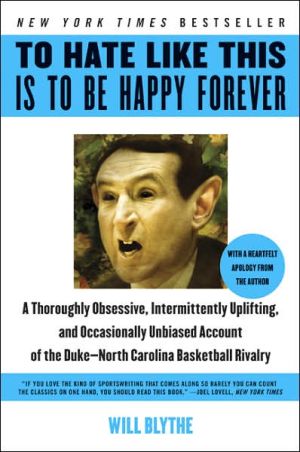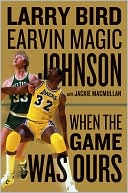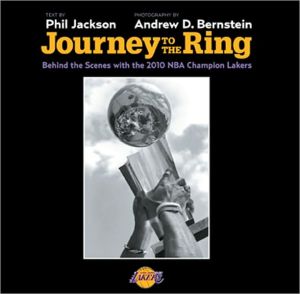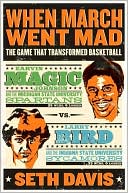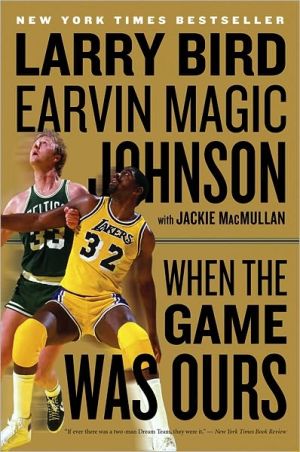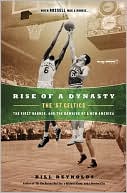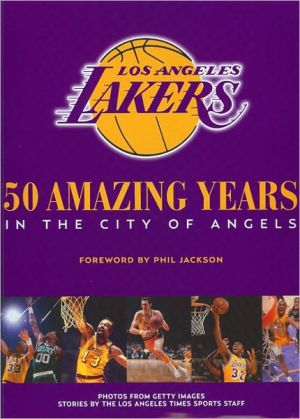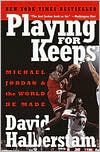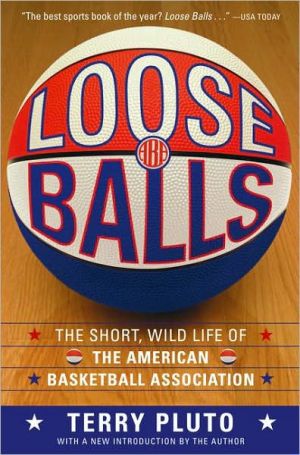To Hate Like This Is to Be Happy Forever: A Thoroughly Obsessive, Intermittently Uplifting, and Occasionally Unbiased Account of the Duke-North Carolina Basketball Rivalry
A thoroughly obsessive, intermittently uplifting, and occasionally unbiased account of the Duke–North Carolina basketball rivalry
Search in google:
"It is a basketball rivalry that simply has no equal. Duke vs. North Carolina is Ali vs. Frazier, the Giants vs. the Dodgers, the Red Sox vs. the Yankees. Hell, it's bigger than that. This is the Democrats vs. the Republicans, the Yankees vs. the Confederates, capitalism vs. communism. All right, okay, the Life Force vs. the Death Instinct, Eros vs. Thanatos. Is that big enough?" The basketball rivalry between Duke and North Carolina is the fiercest blood feud in college athletics. To legions of otherwise reasonable adults, it is a conflict that surpasses sports; it is locals against outsiders, elitists against populists, even good against evil. It is thousands of grown men and women with jobs and families screaming themselves hoarse at eighteen-year-old basketball geniuses, trading conspiracy theories in online chat rooms, and weeping like babies when their teams -- when they -- lose. In North Carolina, where both schools are located, the rivalry may be a way of aligning oneself with larger philosophic ideals -- of choosing teams in life -- a tradition of partisanship that reveals the pleasures and even the necessity of hatred. What makes people invest their identities in what is elsewhere seen as "just a game"? What made North Carolina senator John Edwards risk alienating voters by telling a reporter, "I hate Duke basketball"? What makes people care so much? The answers have a lot to do with class and culture in the South, and author Will Blythe expands a history of an epic grudge into an examination of family, loyalty, privilege, and Southern manners. As the season unfolds, Blythe, the former longtime literary editor of Esquire and a lifelong Tar Heels fan, immerses himself in the lives of the two teams, eavesdropping on practice sessions, hanging with players, observing the arcane rituals of fans, and struggling to establish some basic human kinship with Duke's players and proponents. With Blythe's access to the coaches, the stars, and the bit players, the book is both a chronicle of personal obsession and a picaresque record of social history. The Washington Post - Jonathan Yardley You don't have to be a Tar Heel or a Blue Devil to like To Hate Like This Is to Be Happy Forever (a mouthful of a title) because it's funny, perceptive and smart. The best book about basketball is still David Halberstam's The Breaks of the Game, but Blythe holds his own in that particular rivalry.
To Hate Like This Is to Be Happy Forever\ A Thoroughly Obsessive, Intermittently Uplifting, and Occasionally Unbiased Account of the Duke-North Carolina Basketball Rivalry \ \ By Will Blythe \ HarperCollins Publishers, Inc.\ Copyright © 2006 Will Blythe\ All right reserved.\ ISBN: 006074023X \ \ \ Chapter One\ The Object of My Affliction\ My Little Duke Problem\ "A man who lives, not by what he loves\ but what he hates, is a sick man."\ -- Archibald Macleish\ \ I am a sick, sick man. Not only am I consumed by hatred, I am delighted by it. I have done some checking into the matter and have discovered that the world's great religions and wisdom traditions tend to frown upon this.\ Therefore, dear reader, I need your prayers. But even more than I do, the University of North Carolina's basketball team, the object of my obsession, needs them. Here is the depth of my sickness. It is several years back on a beautiful afternoon during basketball season. The cable is out. (Note to self: Kill Time Warner.) I am alone in my apartment in New York City, frantically hitting the refresh button on my computer screen, getting the updates of Carolina's shockingly bad performance against its archrival, Duke. So far, the Heels have shot 18 three-pointers and hit exactly five.\ There is no end to my gloom. My father is in his grave, my marriage is kaput, my girlfriendis said to be in Miami (though what she is doing there I can't say, since we're not speaking), I have no income, and yet the thing that is driving me over the edge is a basketball game that I can't even see. North Carolina, my beloved North Carolina, is being brutalized by Duke, being outplayed by opponents who are too kind, too mannerly even to gloat. At least when your rival gloats, you know victory over you means something. Again and again, I hit the refresh button and am transported anew to a message board resounding with rending cries and moans from fellow Carolina obsessives, posting their dismay, miss by brutal miss. It's like tuning in to the distracted mutterings of old men alone on park benches, all over America. There are so many of us.\ Grown men, presumably a lot like me, are spending their Sunday afternoon on the Inside Carolina message board, writing things like "I wanna hurl." BlueBlood cries, "My sixth-grade students are gonna rip me a new one."\ While I myself never post, content to lurk, I've come to know the personalities of some of the posters. The clever but doomsaying Jeff Brown opened one season by writing an amusing, if despairing, list with the title "We Just Have a Few Minor Problems." A guy calling himself The Critic, who gets on my nerves with his constant pessimism, says, "Good night, folks."\ I won't eat. I can't eat. Or maybe I should eat, since there is the possibility, faint perhaps, that through a small, apparently unconnected action, like ordering sushi from the Malaysian place down the street, I will change the karmic pattern at work in this game. It's chaos theory and not to be sniffed at. What's that classic example -- a butterfly flaps its wings in the Amazon and two weeks later a major hurricane devastates the Bengal peninsula? Or, to put it in my terms, perhaps a tuna roll inside out will allow Jason Capel to actually hit a three-point shot. Maybe a bowl of chirashi will cause Brian Morrison to stop booting the ball out of bounds. And a nip of sake may teach goddamn Kris Lang (as he is known in my household) to hold on to the ball.\ A former teacher of mine, a great scholar of Southern literature, believes that he can control games by maintaining the same posture throughout the contest and by doing some kind of weird voodoo gesture with his fingers every time an opposing player shoots a free throw. I'd rather try eating, so I order the sushi, but nothing works. Carolina is shooting 29 percent from the field, and Lang has exactly one rebound. Like a cancer patient, I continue to make bargains with God (who I am not sure even exists). But He must not be watching this game. Another Tar Heel three clangs off the rim. They lose by 26.\ The message board erupts. Coolheel: "I could have shot 5 for 18 from 3 myself after having a six-pack, which was much needed to endure the flow of this stinker." UNCodeCorrect: "It's a huge shit sandwich and we're all going to have to take a bite."\ Another fan writes, "I may have to sit out this year with a bad back," a pointed reminder of the hated Duke coach Mike Krzyzewski's condition during the 1994-95 season, when the Blue Devils suffered a beautifully horrible time of it, finishing 13 to 18. Overburdened, Krzyzewski took a leave of absence from coaching that year. Rumors swirled through the Research Triangle of the Duke coach in tears, huddled in his bedroom, wrapped in a bathrobe, muttering more inanities than Dick Vitale. Now, the normal human certainly would feel sympathy for a man in such pain. But I am a North Carolina fan and by definition, at least when it comes to Duke, not a normal man.\ I came naturally by my prejudice in this matter from my father, William Brevard Blythe II. He was a lifelong North Carolinian, born in Mecklenburg County in 1928. His childhood during the Great Depression was paradisiacal, or so he portrayed it to his children, whom he liked to tease for being "city kids." (Until we got older and learned to hit back, we would actually cry when he called us this.) He had a pony and a dog; he roamed through the woods and the fields without supervision; he and a couple of friends had the initiative to build their own tennis court when they decided they wanted to learn the game. Like his father before him and like me after him, he graduated from the University of North Carolina. He could not understand why you might want to live in some other place. He loved his home state (trees, birds, soil, fish, crops, counties, ladies, barbecue) in a way that few people seem to love their home states anymore, home being a quaint, antique concept in a nomadic and upwardly mobile America.\ \ Continues... \ \ \ \ Excerpted from To Hate Like This Is to Be Happy Forever by Will Blythe Copyright © 2006 by Will Blythe. Excerpted by permission.\ All rights reserved. No part of this excerpt may be reproduced or reprinted without permission in writing from the publisher.\ Excerpts are provided by Dial-A-Book Inc. solely for the personal use of visitors to this web site. \ \
\ Jonathan YardleyYou don’t have to be a Tar Heel or Blue Devil to like [THLT], because it’s funny, perceptive, and smart.\ \ \ \ \ Adrian Nicole LeBlanc"Blythe seduces with his story of Southern identity...passed down from fathers to their roaming sons...raucous, tender, and fierce."\ \ \ Pat Conroy"The best book on basketball I have ever read ... destined to become a classic of sports literature."\ \ \ \ \ Anthony Swofford"Not since Exley’s A Fan’s Notes has anyone produced such a graceful and elegiac evocation of place, family, and sport".\ \ \ \ \ Hartford CourantThe best book about politics I've read since All the King's Men ... it’s about basketball [like] Moby Dick is about whaling.\ \ \ \ \ New York PostBlythe makes you want to scream from the sidelines... while his hate is contagious, the obvious affection behind it remains.\ \ \ \ \ Greensboro News & RecordThe best book about loving a team since "A Fan’s Notes" ... [a book] about a lot more than basketball.\ \ \ \ \ New York Times Book ReviewGoes far beyond the facile John Feinstein "inside a season" formula ... [Blythe] writes amusingly, self-deprecatingly and often beautifully.\ \ \ \ \ ElleBlythe writes like a wizard ... Even if college basketball isn’t your obsession, you’ll get caught up in this.\ \ \ \ \ Baltimore SunBlythe brings great wit, style, and insight... a long-awaited American answer to Fever Pitch.\ \ \ \ \ Sports IllustratedHilarious and remarkably wise ... you don’t want to say too much about [this book], for fear of spoiling the surprises.\ \ \ \ \ Play (New York Times Magazine sports supplement)"The kind of sportswriting that comes along so rarely you can count the classics on one hand . . . read this book."\ \ \ \ \ Sports IllustratedHilarious and remarkably wise ... you don’t want to say too much about [this book], for fear of spoiling the surprises.\ \ \ \ \ ElleBlythe writes like a wizard ... Even if college basketball isn’t your obsession, you’ll get caught up in this.\ \ \ \ \ New York Times Book ReviewGoes far beyond the facile John Feinstein “inside a season” formula ... [Blythe] writes amusingly, self-deprecatingly and often beautifully.\ \ \ \ \ New York PostAn exceptionally entertaining parable in defense of good, healthy, all-American loathing.... an animosity the whole family can share.\ \ \ \ \ Hartford CourantThe best book about politics Íve read since All the Kinǵs Men ... it’s about basketball [like] Moby Dick is about whaling.\ \ \ \ \ Greensboro News & RecordThe best book about loving a team since “A Fan’s Notes” ... [a book] about a lot more than basketball.\ \ \ \ \ Play (New York Times Magazine sports supplement)“The kind of sportswriting that comes along so rarely you can count the classics on one hand . . . read this book.”\ \ \ \ \ Hartford CourantThe best book about politics I've read since All the King's Men ... it’s about basketball [like] Moby Dick is about whaling.\ \ \ \ \ Jonathan YardleyYou don't have to be a Tar Heel or a Blue Devil to like To Hate Like This Is to Be Happy Forever (a mouthful of a title) because it's funny, perceptive and smart. The best book about basketball is still David Halberstam's The Breaks of the Game, but Blythe holds his own in that particular rivalry.\ — The Washington Post\ \ \ \ \ Franklin FoerFans of college basketball will wish that all sportswriters possessed Blythe's ability to describe a game, to translate its tension and render its action. (Writing about the Duke sharpshooter J. J. Redick, he says, "When he missed, North Carolina fans felt spared an execution, as if they'd already been standing blindfolded in front of the wall when the last-minute reprieve came in from the governor.") They will enjoy his impeccable miniature profiles of the corporate conservative Coach K and his longtime liberal Carolina counterpart, Dean Smith. (Do my descriptions inadvertently reveal just how effectively Blythe has spun me?) Blythe tells much of the season's story through a backup North Carolina guard named Melvin Scott, who began his career as one of the most sought-after high school players in the country. We watch Scott suffer through the dashed expectations and travel with him to his childhood home in the Baltimore ghetto.\ — The New York Times\ \ \ \ \ Publishers WeeklyFor a reviewer who's not all that clear on the difference between basketball and basket weaving, this book is a revelation. Former Esquire editor Blythe's debut is an examination of the rivalry between the University of North Carolina and Duke University college teams; in it, he interviews and profiles players and coaches, and even gives play-by-plays of key games. And yet, it is not "just" a sports book. At heart it's a memoir. Like Pat Conroy's My Losing Season and even Frederick Exley's A Fan's Notes, to which the author Anthony Wofford compares it, To Hate Like This is about family and passion and people and parents and aging and, oh, yeah, some sports, too. Blythe is a native North Carolinan whose UNC passion was bred in the bone; he and his siblings were raised to be genteel and polite about all things, except while watching basketball games, particularly against arch-rival Duke. After living in New York for many years, Blythe returns home as his father is dying and reflects on the passion that has shaped him and, he suggests, his region. Forget the Mason Dixon line, the real division in this border war is between Carolinians who support the Blue Devils and those who live for the Tarheels. Sports fans can expect to enjoy the accounts of particular pivotal games recounted here, but the real revelations for the relatively uninitiated are Blythe's portraits of his characters: the tough-guy coaches like Mike Krzyzewski and Dean Smith, one of whom nearly breaks down confessing that he's still in love with his ex-wife; the nurse tending Blythe's dying father; and, most of all, the father himself, the kind of personality you expect to meet in great southern novels from Harper Lee to Pat Conroy. To call To Hate Like This a sports book is to be only about one-third right. An elegy to place and time and generation, it is also a story of fathers and sons and an elegant testament to the way pastimes are far more than ways to pass the time. (Mar. 1) Sara Nelson is the editor-in-chief of Publishers Weekly. Copyright 2006 Reed Business Information.\ \
